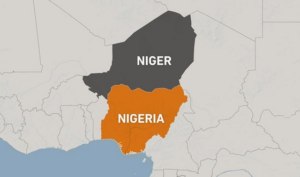By Ere-Ebi Agedah Imisi
On Wednesday March 13, 2024, President Bola Tinubu issued a directive for the opening of Nigeria’s land and air borders with Niger for the free movement of people and commercial activities. He also directed the restoration of electricity supply to the Republic of Niger. The announcement of the reopening of Nigeria’s border with Niger has elicited a range of reactions from the populace. While some greeted it with excitement and relief, others remained indifferent due to a lack of understanding or misinformation about its significance.
In the Illela border community of Sokoto State, residents there received the news with jubilation as life between both countries intertwined harmoniously, but had been adversely affected by the seven months closure.
Given the close proximity and shared border between Nigeria and Niger, the decision to reopen the border assumes greater significance. Notably, this move has contributed to alleviating the mounting tensions along the border, marking a timely intervention. In times of strained relations, the resumption of border activities serves as a pivotal step towards fostering harmony and cooperation between the two nations. Indeed, there is never a perfect time to pursue the path of peace, and the decision to reopen the border reflects a concerted effort towards de-escalating tensions and promoting mutual understanding.
How It Began
The chain of events leading to the border closure and sanctions began on July 26, 2023, when Niger Republic was plunged into political uncertainty following a military coup. This confusion disrupted the nation’s relations with neighboring countries within the Economic Community of West African States (ECOWAS).
With the presidential guard seizing power and detaining President Muhammad Bazoum, General Abdourahamane Tchiani was appointed as the junta’s leader, establishing a transitional government slated to govern for three years.
Subsequently, ECOWAS, under the leadership of Nigeria’s President Tinubu, issued a stern ultimatum to the junta on July 30, demanding the restoration of President Bazoum within one week or face severe international sanctions and the possibility of military intervention. In response, borders with Nigeria were promptly sealed as the specter of military action loomed large.

As time passed, the junta, in collaboration with counterparts from Mali and Burkina Faso, opted to withdraw their membership from ECOWAS. This decision strained relations between the regional bloc and the three member nations, although the imposition of heavy sanctions yielded limited results in compelling the countries to transfer power to civilian authorities.
READ ALSO: Where Is Niger’s Mohammed Bazoum?
Fortunately, the decision by the Nigerian president on Wednesday to reopen the borders with Niger implies a significant shift in regional dynamics. This move holds potential implications for trade, commerce, and economic development on both sides of the border, promising a renewed era of cooperation and growth.
Why The Shift?
A senior diplomatic journalist with over 10 years experience in foreign affairs based in Abuja, Nigeria, Segun Ojumu told Heritage Times (HT) that considering the economic strain on both parties and regional decisions, a reopening was inevitable.
‘‘We must remember that the sanctions imposed was due to the internal situation in Niger, after regional decision and likely considering the economic strain on both countries and the wider region a reopening was inevitable and this allows you to return to the diplomatic table, allows you to return to normalcy and then parties can talk about the differences, have a point of convergence and hopefully normalcy can return to the relationship between both parties’’
What Are The Economic Benefits
Meanwhile, the reopening of Niger’s border with Nigeria aligns with broader efforts towards regional integration and cooperation in West Africa. By fostering closer economic ties between neighboring countries, the move contributes to the realization of regional economic integration goals, such as those outlined in the ECOWAS framework.
Ojumu added that the reopening of the border is expected to facilitate increased trade revival between Niger and Nigeria, two neighboring countries with significant economic ties.
‘‘Business have literally been on hold, they can resume and this will increase cross border trade, boast economic activities in both countries, the truth is that lots of truck have been stuck on the high ways leading to Niger, goods couldn’t come in or go out, so all of this really strained finances and people who depend on trade between both countries.
‘‘On improved connectivity, now we can have easier movement of goods and people and this will strengthen regional economic ties. For some time now, the airways was shut you cannot travel through Niger, but all this has opened, so there’s an improved connectivity’’
What Next

Considering the fact that Nigeria has been faced with insecurity and there continues to be allegations and counter speculations that these groups move their victims through the bored states in to Niger, collaborative initiatives between Niger and Nigeria, such as joint border patrols, information-sharing mechanisms, and capacity-building efforts, will be crucial in addressing security challenges and maintaining law and order in border regions.
However, Ojumu maintained that dialogue should continue between both parties.
‘‘Maintaining open communication between Nigeria and Niger is crucial to prevent future disruptions and focus on regional stability, addressing the underlining issues that led to the sanctions can ensure lasting economic stability, you know that Niger is very crucial in the fight against book haram and other forms of insurgents.
‘‘If both countries are not in unity that war will suffer, Recall that when President Buhari came into power in 2015, the first country he visited was Niger to show how important this relationship is for both countries and to foster regional stability.
‘‘There is also a potential for growth, reopening the border opens the door for further economic corporation between both countries’’.
While the move holds significant potential for development, it also poses challenges related to agriculture, border management, and security. By leveraging the opportunities presented by the reopening of the border and addressing potential challenges through collaborative efforts and targeted interventions, Niger and Nigeria can unlock the full economic potential of their bilateral relationship and contribute to the prosperity and well-being of its citizens.

































